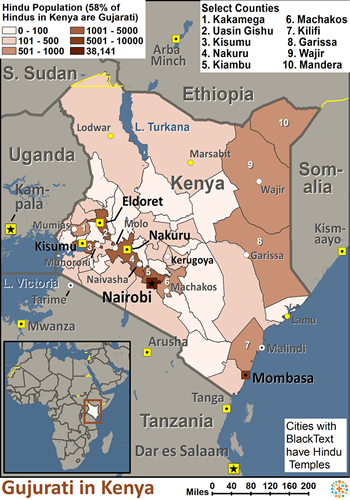The Gujarati are primarily classified as the inhabitants of the state of Gujarat, western India. For most of them, Gujarati is their native language. They are a complex people group, speaking various dialects and having many cultural distinctions. Some of these differences are based on region, while others are based on their "caste" (social class) or community. Gujarat is one of the most industrialized states in India. Its lengthy coastline and numerous harbors have made it a focal point of travel and trade. The Gujarati are known as being resourceful businessmen. This has helped them to successfully emigrate and thrive around the world.
The state of Gujarat has long been an important center for trade, and their merchants have been sent all over the world. Today there are significant Gujarati communities in some 27 nations. Many are in Africa but others are in Myanmar, Iran and Malaysia. Living conditions in these countries vary; however, the Gujarati who have emigrated are usually from the higher, wealthier castes and have maintained many aspects of their own culture. They are often involved in international trade or in operating small businesses.
Gujaratis have been in Kenya since colonial days. Today they have a large and prestigious school that not only teaches valuable skills but also the Gujarati language.
Most marriages in Gujarati societies are arranged. For the Hindu Gujarati, caste and social rank are very important considerations. The Muslim Gujarati are only allowed to marry those from selected groups. Marriage is considered to be an alliance between two families, not just two individuals.
The folklore of the Hindu Gujarati reflects the mythology surrounding the Hindu deity, Krishna. Dances in honor of Krishna have survived in the form of the popular folk dance known as garaba.
The majority of the Gujarati are Hindus, regardless of their location in the world. However, a significant number are Islamic. The Hindu clergy are drawn from the highest caste, the Brahmins. Therefore, becoming a priest is essentially a matter of birthright, although not all Brahmins practice as priests.
Hindus worship many gods, some of which are animals. Cows are sacred, but they revere monkeys, snakes, and other animals as well. They teach such things as yoga and reincarnation (a continual cycle of death and rebirth). They believe that the soul may be reincarnated as an animal or as a human. The law of karma states that every action influences how the soul will be born in the next life. If a person lives a good life, his soul will be born into a higher state. Whereas, if he leads an evil life, his soul will be born into a lower state, perhaps even as a worm! The cycle continues until spiritual perfection is achieved. Then the soul enters moksha, a new level of existence, from which it never returns.
Hindu shrines contain sculptured images of their gods. Everyday priests wash and dress the images and bring them food. This is not considered idol worship since they believe the gods are actually present in the images.
The Gujarati Hindus hope to better their positions in this life and in the life to come by exhibiting charity, being devoted to the gods, and showing mercy to fellow humans and cows.
In many countries where there are Gujarati communities, there are no missionary agencies focusing on this people group. The Bible is available in their language, but the Gujarati must see Christianity lived out. Only then will they understand that true freedom and peace are found in Jesus Christ alone.
Prayer alone has the power to release these Hindus from the bondage of worshiping many gods. Likewise, only intercession can break the strongholds of Islam.
Ask the Lord to raise up missionaries who are willing to share Christ with the Gujaratis in Kenya.
Ask God to strengthen, encourage and protect the small number of Christians living among them.
Pray that Gujarati Christians will be bold in their witness for Christ.
Pray that Gujarati businessmen will be evangelized and take the gospel to their own people.
Ask the Lord to raise up Gujarati disciples who will make more disciples.
Scripture Prayers for the Gujarati in Kenya.
https://en.wikipedia.org/wiki/Indians_in_Kenya
https://timesofindia.indiatimes.com/city/ahmedabad/celebrating-25-years-of-gujarati-ness-in-nairobi/articleshow/63550854.cms
https://www.jamiiforums.com/threads/meet-the-richest-man-in-kenya-from-gu
| Profile Source: Joshua Project |




























